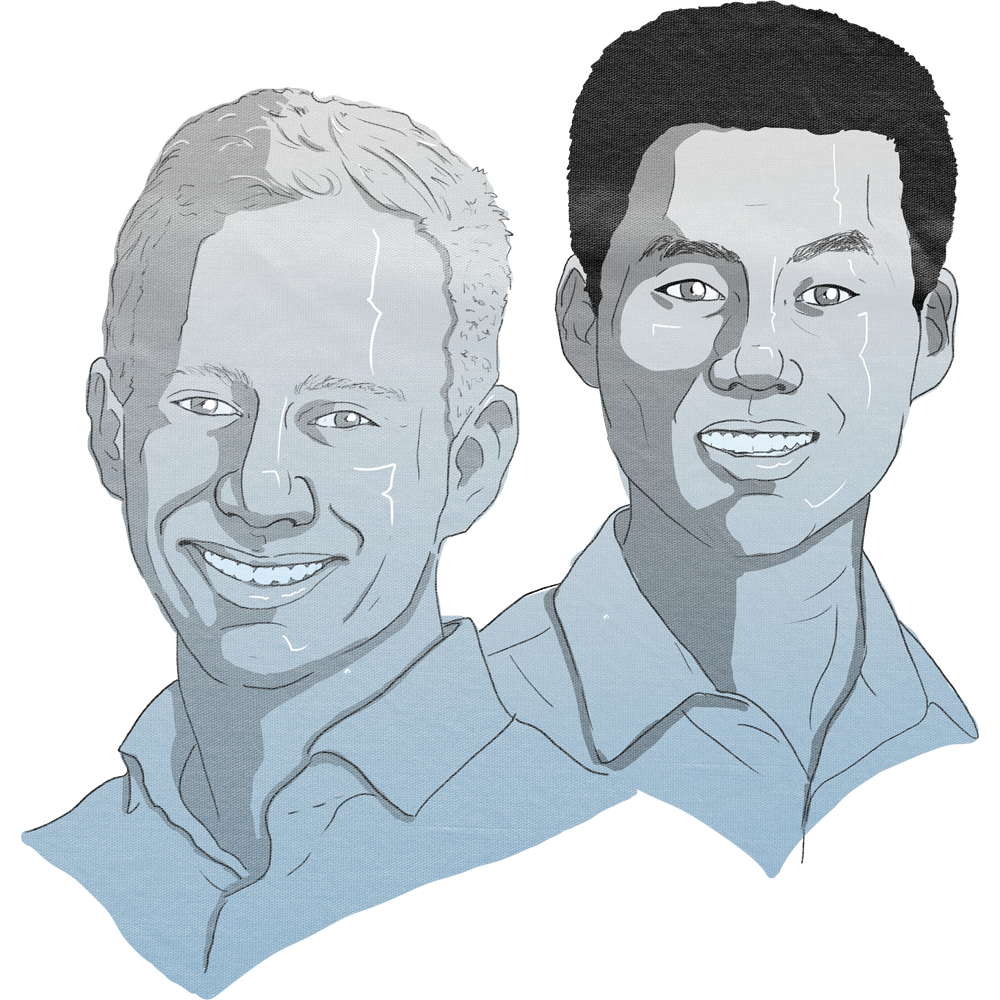[vc_row][vc_column][vc_separator color=”black”][vc_column_text]Growing up in Point Verte, a small fishing village located in New Brunswick, Robert Kirstiuk distinctly remembers the docks of his hometown. While the Maritimes may be globally synonymous with coastal beauty and the rich bounty of the ocean, Kirstiuk’s memory vividly recalled his experiences seeing the local fishermen trying to sell their catch, struggling to earn a fair income for their work.
It was when he revisited this memory during university with his friend, Joseph Lee, that they recognized an opportunity to radically change an industry characterized by tradition and run by a small group of powerful players. From there, Freshline was born.
A marketplace that eliminates the middleman, Freshline (formerly known as Coastline) gives fishers the ability to cast a wider net to potential customers while simultaneously providing them with transparency in where their food is coming from.
From the Bay Street Bull’s 2020, 30 x 30 guide, for this week’s entrepreneurial spotlight, editor-in-chief Lance Chung discusses with Lee, from their Vancouver headquarters, how he built Freshline with co-founder Kirstiuk, the importance of harnessing data, and global domination.[/vc_column_text][/vc_column][/vc_row][vc_row][vc_column][vc_text_separator title=”Q & A” color=”black”][vc_row_inner][vc_column_inner width=”1/2″][vc_single_image image=”17593″ img_size=”full”][/vc_column_inner][vc_column_inner width=”1/2″][vc_single_image image=”17594″ img_size=”full”][/vc_column_inner][/vc_row_inner][/vc_column][/vc_row][vc_row][vc_column][vc_column_text]Can you describe what Freshline is?
Freshline is an online marketplace connecting harvesters, fishers, and producers directly to hundreds of restaurants and retailers across Canada and the United States. You can essentially think of us as an Amazon for seafood. The value for the chefs is firstly quality. We’re able to automate a lot of operational work throughout the supply chain and essentially give them fresher seafood that’s more traceable than the competition. Number two is price. We’re able to cut out a significant number of middlemen from the supply chain and deliver pricing that is at least on par or less than what they see through wholesale channels. Number three is convenience, data, and technology. [Chefs] can now make all their seafood purchases online instead of having to fax, text, or call their reps. They have full visibility of the product, pricing, availability and can get data on what they’re purchasing, the seasonality of the market, popular items and skews, and more.
Why was this an industry that you wanted to tackle?
The concept behind Freshline came about when Robert and I were chatting about his experience back in the Maritimes. He comes from four to five generations of people who worked in the fishing industry in one way or the other, whether through processing, packing, fishing, or seafood trading. We were talking about an experience that he had with a commercial fisherman, who was going dock to dock in every small village trying to sell bits and pieces of his catch before selling to the broker or the middlemen in the main city. We started asking ourselves why he was going through this arduous process trying to sell such small volumes of seafood. Through that process of investigation, we found out that the seafood supply chain is very complicated, extremely traditional, and was often dominated and monopolized by very few players. We asked ourselves how we could democratize access to smaller-scale fishermen and enable them to sell directly to consumers, restaurants, or retailers. That was the original thesis, and it’s a little different from what we have today, but it was the gateway and impetus that gave us the motivation to jump into the industry and just start learning and doing.
Did you have any established relationships in the industry, or did you have to start from scratch?
It was more of the latter. We had some inherent knowledge from Robert’s side of the family, but what we were trying to build was very new, innovative, and disruptive. We had to learn everything from the ground up. Instead of knocking on doors, we were going to independent docks across Canada and the United States and just tried to get in touch with the people running the show. We wanted to learn as much as we could and, while making mistakes and pivoting along the way, ultimately landed on our current product.[/vc_column_text][vc_single_image image=”17590″ img_size=”full”][vc_column_text]On that note of pivoting, how have you been able to stay nimble and agile as a business?
For us, it’s all about being data-driven. Rob and I try not to have egos about decision-making. We try to be pretty black and white on what’s right and wrong. We have to go with our gut, but at the same time we try to be as quantitative and data-driven as humanly possible. If we see that something just doesn’t have the clout or traction in the market, it makes more sense for us to cut it out.
What has been your biggest challenge in building Freshline?
One of the biggest challenges is information asymmetry. There’s incomplete information and data, and as much as we want to be quantitative, sometimes you have to take the risk and go with your gut. We solved the lack of information and uncertainty in the market by just surrounding ourselves with smart, talented people, whether it be our actual employees who are building the business with us on the ground level, or the advisors, mentors, and investors that have been in similar situations and industries, and were able to navigate past the status quo to build amazing businesses. It’s really been about leaning on those around us to help us fill in our missing gaps and power us through some rough seas.
From a mental health standpoint, entrepreneurs put a lot onto their plates. How do you find balance in your life?
I think one of the biggest challenges that I personally had was decoupling myself from the business. It’s about understanding that the success of the business doesn’t dictate who we are as people and what we identify as. In the same way, if the business fails along the way, that has no indication on whether or not we’re failing at life as a whole. [Understanding this] has been tough. You pour your heart and soul into something, and you become known as the person that founded company X or company Y. That is your brand, and it’s your identity amongst your peers and your network. It’s tough to disassociate from that, but it’s really important to take a bird’s eye view approach. You have to understand that you’re learning and growing every day, and the experience is going to make you a better entrepreneur at the end of the day. I just take it step by step and invest in myself. What a lot of founders fail to understand at times, myself included, is to invest in yourself, whether it’s through resources, giving yourself time off, exercising, eating right, paying yourself a decent salary. Those are all things that people take for granted and bypass, but it’s actually the best ROI decision for the business because your health, efficiency, motivation, and happiness have a direct correlation on the success of the company, overall.[/vc_column_text][vc_column_text]As a team of co-founders, how do you support each other and divide your responsibilities?
In terms of keeping each other in the loop, we have a standard touch basis every week where we talk strategy and about what’s happening within the company. But it’s also super important for us to feed control to each other and other members of the team. When you’re a small team, you’re a scrappy three- to five-person team and it’s really easy to have your fingerprints on every single decision that’s being made at the company. The tough thing has been about learning how to let go even if you think you can do something better or faster than someone else. It’s the best decision for the company to step back and let someone else drive, and the same goes for co-founder relationships. You need to divvy things up and say, “Hey, I trust you and have enough conviction in your aptitude to deal with legal, finance, marketing, and sales while I deal with engineering, product, strategy, or whatever it may be.” It’s about having enough trust to let go and work in your own vertical while still obviously staying coupled together and having context on what’s happening.
You talk about learning how to let go. How do you know when it’s time to let go of something that you’re pursuing and move on to something else so that it doesn’t take up more of your time, resources, and energy?
The way I always think about it is, I want to make myself redundant to the day-to-day of the business. I want to put the business in a position where it can run and succeed without having to come to me, or me being the bottleneck to decision-making or moving quickly. I’m making myself redundant where I can help provide strategic vision and paint a picture, but get out of people’s way so that they can go out and execute.
How do you define success for your company? Which KPIs do you track, and how do you measure success overall?
From an overlying vision, our goal is to democratize access and reinvent perishable seafood worldwide. That is really our goal. At the same time, success to our investors is growth in our monthly active users—how many unique restaurants are ordering every single month? It could also be GMV (Gross Merchandise Value), the flow of the value of goods through our platform, number of transactions, etc. There are a number of different things that we look at but really the vision and the mission is about reinventing perishable seafood worldwide.
There is also a big dialogue around conservation, sustainability, and the environment. Does your company speak to these themes?
100 percent. We’re not the supplier or the ones who are processing or harvesting the products but what we do on our side is offer transparency, accountability, and traceability. We put everything out there so that the buyer can make informed decisions based on their own conviction. We don’t want to say that we offer only products that are certified X or certified Y, but what we do say is, “Hey, we’re going to have all sorts of sustainable products and we’re going to tell you exactly where it’s from, exactly how it was processed, who harvested it, along with what their certifications and mandate are.” Ultimately we’re leaving the decision-making up to you. You’re competent and we know you care so we’re going to give you all the information. We trust you to make the right decision for your business.[/vc_column_text][vc_single_image image=”17591″ img_size=”full”][vc_column_text]What is a milestone that you are most proud of?
I think it’s our team. Obviously hitting revenue targets and customer targets is great. But really, the team is what I’m most proud of. I think we have a really awesome, motivated, empowered, and honest team here at Freshline. Everyone respects one another. We have an amazing culture that we’re building here. That’s what I’m most proud of.
How do you go about cultivating a team of leaders who are empowered to grow within your company?
We’re very evidence based, so we don’t like to create hierarchy if we can avoid it. We started off by having, and still do, a very flat organization based on meritocracy where the best and brightest ideas win regardless of where they came. Through that process, what we try to avoid is bureaucracy and office politics. It’s about having everyone on a level playing field with radical candor, where you’re recognizing and congratulating people for their ideas and output.
What advice would you give to other founders who want to build an impactful business?
The biggest thing that I’ve taken away is that success takes time. It’s really easy to romanticize San Francisco- or Silicon Valley-based businesses that are growing 20, 30, 40 times a year and achieving massive amounts of capital. What’s realistic is that businesses take time. Success takes time. In most instances, behind all that glamour is persistence, grit, determination, and survival. You either push through all the hills and valleys until you reach your goal or you get lucky and get hired by people. What you see in the newspapers and tech publications isn’t actually what’s happening.
What excites you about the future for your business?
For us, it’s scaling what we have across Canada into a global company. Our ambition isn’t to be a regional startup. We want to be a global one, and a household name across the world. We’re going to start by expanding to Montreal. We are already in Toronto, but we’re planning on growing that market quite significantly and then into the United States, potentially Europe, and to Asia and beyond. We’re pretty excited about our global ambitions.[/vc_column_text][/vc_column][/vc_row][vc_row][vc_column][/vc_column][/vc_row]












